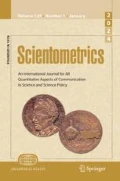Abstract
The tremendous social and political changes that culminated in the Soviet Union's dissolution had a great impact on the Russian science community. Due to the Russian transformation to a market economy a new model of R&D emerged on the basis of the higher education system (R&D in universities). This paper is part of a project, the main goals of which were to analyse the impact of competitive funding on R&D in provincial universities, the distribution of funding by the Russian Foundation for Basic Research, and the level of cross-sectoral and international collaboration. This paper gives a descriptive overview of R&D conducted at the 380 provincial universities, looking at 9,800 applications, 1,950 research projects, 19,981 individuals, and more than 29,600 publications for the period 1996–2001. Our data demonstrated a positive tendency in demographic statistics in the provinces. A map of intra-national collaboration taking place in 1995–2002 in provincial universities situated in different economic regions was designed. Our data show a strong collaboration within the regions, which is an important factor of sustainability. Publication output grew by a factor two or two-and half in six years. The share in output on mathematics was the highest at about 45%, physics and chemistry had equal shares of about 20% each. Researchers from the Ural and Povolzh'e regions were more active in knowledge dissemination than their colleagues from the other nine economic-geographic regions. Bibliometric analysis of more than 1,450 international collaborative publications for 1999‘2001 demonstrated a strong shift in collaboration partners from Former East Block and former USSR countries to Western Europe, USA and Japan. Among the regions, Povolzh'e, Ural, Volgo-Vyatsky and Central Chernozem'e demonstrated a stronger tendency to collaborate. This collaboration depends heavily on financial support from foreign countries.
Similar content being viewed by others
References
Beaver, D. (2000), Reflection on scientific collaboration (and its study): Past, present, future. Paper presented at the Second Berlin Workshop on Scientometrics and Informetrics/Collaboration in Science and Technology and First COLLNET Meeting, Hohen Neuendorf, Germany, p. 14.
Graham, L. (1998), What Have We Learned about Science and Technology from the Russian Experience? Stanford University Press, Stanford California.
Markusova, V. A., V. A. Minin, A. N. Libkind, M. V. Arapov, C. N. M. Jansz, R. J. W. Tijssen (2001), Russian science in transition: the effects of new granting systems on research activity and output. Proceedings of the 8th Biennial Conference of the International Society for Scientometrics and Informetrics, July 16–22, 2001, Sydney, Australia, V.1, pp. 427-438.
Markusova, V. A., V. A. Minin, L. M. Mirabyan, M. B. Arapov (1999), Policy for distribution of grants' in new Russia in 1993–1994 by two funding Agency: International Science Foundation and Russian Foundation of Basic Research. Research Evaluation, 8: 53-59.
Okubo, Y., R. Gusmao, A. Sigogneau, M. Zitt (2000), Measuring impact of trans-frontier regions in Europeanization of science. In: Book of Abstracts, Sixth International Conference on Science and Technology Indicators, Leiden, The Netherlands, p. 88.
Radocevic, S. (2003), Patterns of preservation, restructuring and survival: science and technology policy in Russia in post-Soviet era. Research Policy, 32: 1105-1124.
Science & Technology Indicators 1998 (2000), National Science Board, National Science Foundation, Arlington, VA. Volume 1–2, Available on: www.nsf.gov
Author information
Authors and Affiliations
Rights and permissions
About this article
Cite this article
Markusova, V.A., Minin, V.A., Libkind, A.N. et al. Research in non-metropolitan universitiesas a new stage of science development in Russia. Scientometrics 60, 365–383 (2004). https://doi.org/10.1023/B:SCIE.0000034380.12874.cc
Issue Date:
DOI: https://doi.org/10.1023/B:SCIE.0000034380.12874.cc




